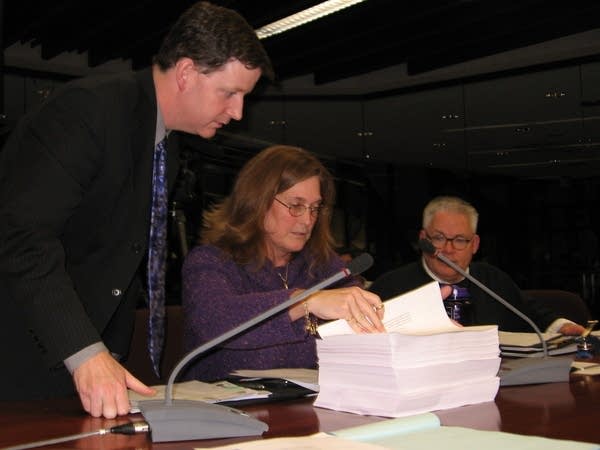Hennepin Co. declines to reconsider absentees
Go Deeper.
Create an account or log in to save stories.
Like this?
Thanks for liking this story! We have added it to a list of your favorite stories.

The slim margin between Norm Coleman and Al Franken has both campaigns watching every vote cast in last Tuesday's election. Al Franken's campaign is even trying to make sure that some rejected absentee ballots are counted.
Franken's attorney David Lillehaug said 461 absentee ballots have been improperly rejected by Hennepin County. He said some were disqualified because the signatures didn't match. Others, he said, were rejected because the voter wasn't properly registered.

Lillehaug said he believes some of those ballots should have been counted.
"Al Franken's philosophy, as stated on the morning after the election, was that every vote properly cast should be counted," Lillehaug said. "We know there are some absentee votes that were properly cast, and we're going to do everything we can to make sure that they are counted."
Turn Up Your Support
MPR News helps you turn down the noise and build shared understanding. Turn up your support for this public resource and keep trusted journalism accessible to all.
Lillehaug asked the the Hennepin County Canvassing Board to reconsider those ballots. The board declined to act on Lillehaug's request, saying the question of the ballots is for the state or the courts to decide.
Matt Haapoja, an attorney with the Minnesota Republican Party, accused the Democrats of trying to create votes.

"This was clearly an example of the Franken campaign trying to find more votes where there aren't votes," Haapoja said.
Haapoja said the appropriate place for such a challenge would be before a judge if the campaign wanted to contest the election results.
Rejected absentee ballots could become a central issue in the close contest. Minnesota Public Radio News was able to contact 61 of the state's 87 county elections officials to discuss the election results, ballot security and their interaction with the campaigns.
Several said the Coleman and Franken campaigns inquired about rejected absentee ballots. Wilkin County's Wayne Behzenik told MPR the campaigns also wanted to know the names of those who had their ballots rejected and why they were rejected. He said he didn't provide the information because it isn't public record.
The campaigns aren't just making inquiries. They are also traveling to some counties and are sitting outside election offices, keeping watch to make sure ballots are secure prior to the recount.
St. Louis County Elections Director Paul Tynjala said Coleman's campaign has kept a constant presence outside of his office.
"They've had representatives here since Election Day," Tynjala said. "There's three of them. Apparently, they had them out in the car over the weekend."
Tynjala and other elections officials say they have talked to both campaigns about ballot security. He said 400 ballots are locked in a safe in Hibbing for a local city council recount.
"The rest of the ballots are all up in our attic, which has no access unless you have authorization. And it's in a room with a steel door with two keys," Tynjala said. "One I have, one the auditor has. There's no way anyone is getting up there."
There isn't a set standard that elections officials use to protect the ballots, but it's certain that elections officials take the job of securing the ballots very seriously. Most election officials say ballots are kept under lock and key.
"They're locked in a secure room in the courthouse," said Tom Reddick with Douglas County. "There are only two keys to the room, and I'm not going to tell you where that room is."
Reddick said neither campaign is insisting on posting a guard to watch the ballots, unless the other campaign does. And if the campaigns did post guards, then Reddick said the county would have to pony up for one, too.
"We're not going to let a couple of strange people just sit around in the courthouse after hours," he said. "That's just not going to happen."
Other county elections officers are taking extraordinary steps to protect the ballots.
"They're in a cell, and the jail correctional officers have given me both of the keys to the cell, so no one can go in there but me," said McLeod County Auditor Cindy Schultz.
Schultz, in effect, incarcerated her ballots in the county jail.
"I had the ballots in a locked room in my building, but it wasn't a 24-hour guarded, closed door," Schultz said. "So, based on the county attorney's recommendation, he said, 'Put them in jail.' And that way they're guarded all the time, the cameras will be on them and no one will go in."
McCleod County's ballots aren't the only ones sitting in jail. Polk County's auditor said that the county's ballots are also in a jail cell. Many other county auditors say they have the ballots locked in closets, in secure safes or in vaults.
An official with Chisago County said the ballots are locked in the office next to his. He said they're in the process of installing electronic locks, and a security camera is monitoring the room constantly.
(Bob Collins, Ambar Espinoza, Curtis Gilbert, Dan Gunderson, Bob Kelleher, Mark Steil, Paul Tosto, Michael Caputo and Tom Weber contributed to this report.)
Dear reader,
Political debates with family or friends can get heated. But what if there was a way to handle them better?
You can learn how to have civil political conversations with our new e-book!
Download our free e-book, Talking Sense: Have Hard Political Conversations, Better, and learn how to talk without the tension.





